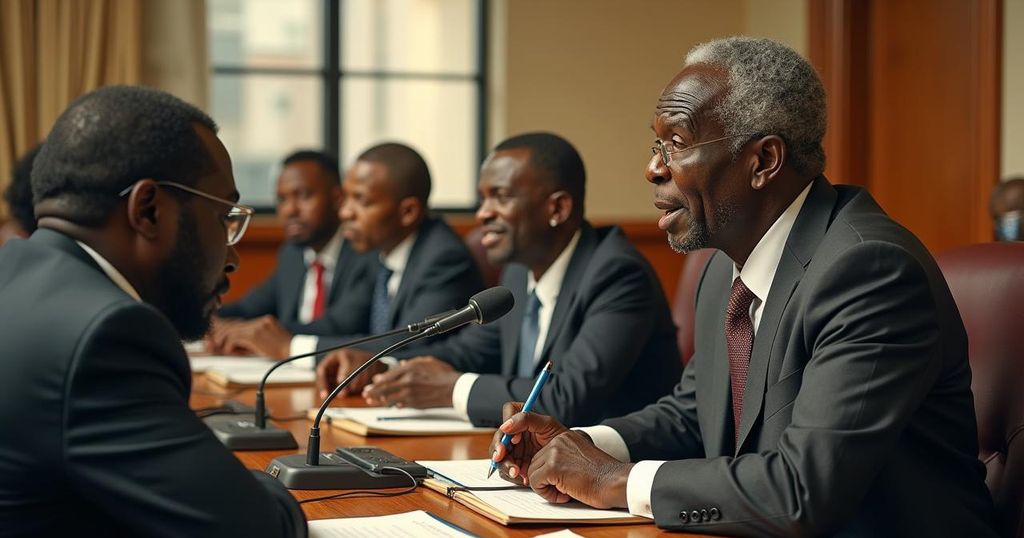South Sudan’s Renewed Efforts to Establish a Hybrid Court for War Crimes

South Sudan is moving to create a Hybrid Court to prosecute war crimes from the ongoing civil conflict that began in 2013, following the passage of two significant bills aimed at facilitating reconciliation and reparations. Despite support from international donors, political resistance within the country presents formidable obstacles to the court’s implementation. Activists and commentators express skepticism about the court’s effectiveness, advocating for traditional reconciliation methods instead.
After almost a decade of conflict and delays, South Sudan is initiating the establishment of a Hybrid Court aimed at addressing war crimes and crimes against humanity that have occurred since the civil war commenced in 2013. The Transitional National Legislative Assembly has recently passed two critical bills—namely the Commission for Truth, Reconciliation and Healing Bill 2024 and the Compensation and Reparation Authority Bill 2024—which serve as the groundwork for the creation of this court. Despite the support from key donors including the Troika—comprising the United States, the United Kingdom, and Norway—there remains considerable resistance among the political elite within South Sudan. They express concerns that the implementation of a Hybrid Court could reignite past grievances. This court was initially endorsed in the Revitalised Agreement on the Resolution of the Conflict in the Republic of South Sudan (R-ARCSS), a peace deal established in 2018 under the auspices of the Intergovernmental Authority on Development. Bona Deng Lawrence, the chairperson of the Standing Specialised Committee on Peace and Reconciliation, emphasizes that the primary objectives of the new legislation are to confront the historical legacy of the conflict, deliver justice and reparations to victims, and provide psychotherapy support for both victims and perpetrators. Since the onset of the civil war, characterized by a power struggle between President Salva Kiir and his deputy Riek Machar, both factions have been implicated in numerous atrocities. Natelina Amjima Malek, Deputy Chair of the Information Committee, further asserts the significance of these bills, which also encompass provisions for restoring damaged infrastructure and compensating families bereaved during the violent episodes of 2013 and 2016. However, there is skepticism regarding whether the Hybrid Court can overcome the entrenched political apathy that has persisted for nearly nine years. A previous peace agreement in 2015, which laid the foundation for the Hybrid Court, has seen little progress in facing opposition from senior leaders who appear to be against its establishment. Civil rights activist Edmund Yakani, Executive Director of the Community Empowerment for Progress Organisation, highlights a stark truth: “The leaders are anti-Hybrid Court. There is also the challenge of how the commission for truth, healing, and national reconciliation and the compensation and reparation process will work in the face of hostility from the political leadership.” In a public statement published in June 2016, both President Kiir and Dr. Machar argued in the New York Times, “South Sudan needs truth, not trials” suggesting that the Hybrid Court could hinder national healing by reintroducing division. They refer to accusations of war crimes as instruments employed by Western powers to manipulate Africa, as articulated by Ezekiel Lol Gatkuoth, a former South Sudanese minister. The ongoing conflict has resulted in catastrophic loss of life, with estimates indicating that over 400,000 South Sudanese have succumbed since 2013. Additionally, 1.5 million individuals remain internally displaced, while approximately 2.2 million are refugees in neighboring countries such as Uganda, Kenya, Ethiopia, and the Democratic Republic of Congo. Political commentator Akol Miyen Kuol expresses doubt about the efficacy of the Hybrid Court, suggesting instead the utilization of traditional community-based reconciliation methods as a more suitable approach at this juncture. He cautions, “I think it is too early for South Sudan to resort to a Hybrid Court to address the war crimes issue. Applying such a mechanism in South Sudan now could exacerbate the already delicate situation.”
The establishment of a Hybrid Court in South Sudan has been a protracted and contentious issue following the onset of civil war in December 2013. The war has resulted in immense suffering, notably war crimes and human rights violations committed by both government forces and opposition groups. While the Restorative Agreement from 2018 recognized the need for accountability and transitional justice, resistance from the country’s leadership has impeded progress. This article discusses the recent legislative developments aimed at overcoming these challenges, alongside the broader implications for peace and reconciliation in the country.
In summary, while the recent legislative developments in South Sudan signal a potential shift towards addressing the grave injustices arising from the civil war, significant concerns regarding the political will and readiness to implement the Hybrid Court persist. The history of resistance to such mechanisms from South Sudan’s leadership, compounded by ongoing instability and the need for community healing, raises critical questions about the future of transitional justice in the nation.
Original Source: www.theeastafrican.co.ke








